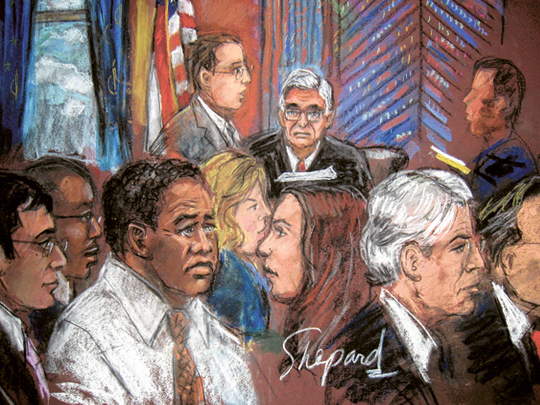
New York: The first Guantanamo detainee to face a civilian trial was acquitted Wednesday of all but one of the hundreds of charges he helped unleash death and destruction on two US embassies in 1998, a mixed result for what's been viewed as a terror test case.
A federal jury convicted Ahmad Ghailani, of Tanzania, of one count of conspiracy to destroy US property and acquitted him on more than 280 other counts, including one murder count for each of the 224 people killed in the embassy bombings in East Africa in 1998. The anonymous jurors deliberated over seven days.
Ghailani, 36, rubbed his face, smiled and hugged his lawyers after the jurors filed out of the courtroom.
US District Judge Lewis Kaplan had thanked the jury, saying the outcome showed that justice "can be rendered calmly, deliberately and fairly by ordinary people — people who are not beholden to any government, even this one."
‘Pleased'
In a statement, Department of Justice spokesman Matthew Miller said US officials "respect the jury's verdict" and are "pleased" that Ghailani faces a minimum of 20 years and a maximum of life in prison at sentencing on January 25.
US Attorney Preet Bharara said in a statement that Ghailani "will face, and we will seek, the maximum sentence of life without parole."
Defence attorney Peter Quijano welcomed the acquittals. He said the one conviction would be appealed.
"We still truly believe he is innocent of all these charges," Quijano said. Still, Ghailani, who could have faced a mandatory life sentence if convicted of some of the other counts, "believed he got a fair trial," he added.
Prosecutors had branded Ghailani a cold-blooded terrorist. The defense portrayed him as a clueless errand boy, exploited by senior Al Qaida operatives and framed by evidence from contaminated crime scenes.
The trial at a lower Manhattan courthouse had been viewed as a test for President Barack Obama administration's aim of putting other terror detainees — including self-professed September 11 mastermind Khalid Shaikh Mohammad and four other terrorism suspects held at Guantanamo Bay, Cuba — on trial on US soil.
US Representative Pete Hoekstra, the top Republican on the House Intelligence Committee, said Wednesday's verdict confirms that the Obama administration's decision to try Gitmo detainees in civilian courts "was a mistake and will not work."
Obama failure
"This case was supposed to be the easy one, and the Obama administration failed — the Gitmo cases from here-on-out will only get more difficult," Hoekstra said in a statement.
Ghailani's prosecution also demonstrated some of the constitutional challenges the government would face if that happens. On the eve of his trial last month, the judge barred the government from calling a key witness because the witness had been identified while Ghailani was being held at a secret CIA prison where harsh interrogation techniques were used.
After briefly considering an appeal of that ruling, prosecutors forged ahead with a case honed a decade ago in the prosecution of four other men charged in the same attacks in Tanzania and Kenya. All were convicted in the same courthouse and sentenced to life terms.
Prosecutors had alleged Ghailani helped an Al Qaida cell buy a truck and components for explosives used in a suicide bombing in his native Tanzania on August 7, 1998. The attack in Dar es Salaam and a nearly simultaneous bombing in Nairobi, Kenya, killed 12 Americans.
The day before the bombings, Ghailani boarded a one-way flight to Pakistan under an alias, prosecutors said. While on the run, he spent time in Afghanistan as a cook and bodyguard for Osama Bin Laden and later as a document forger for Al Qaida, authorities said.
He was captured in 2004 in Pakistan and was held by the CIA at a secret overseas camp. In 2006, he was transferred to Guantanamo and held until the decision last year to bring him to New York.











